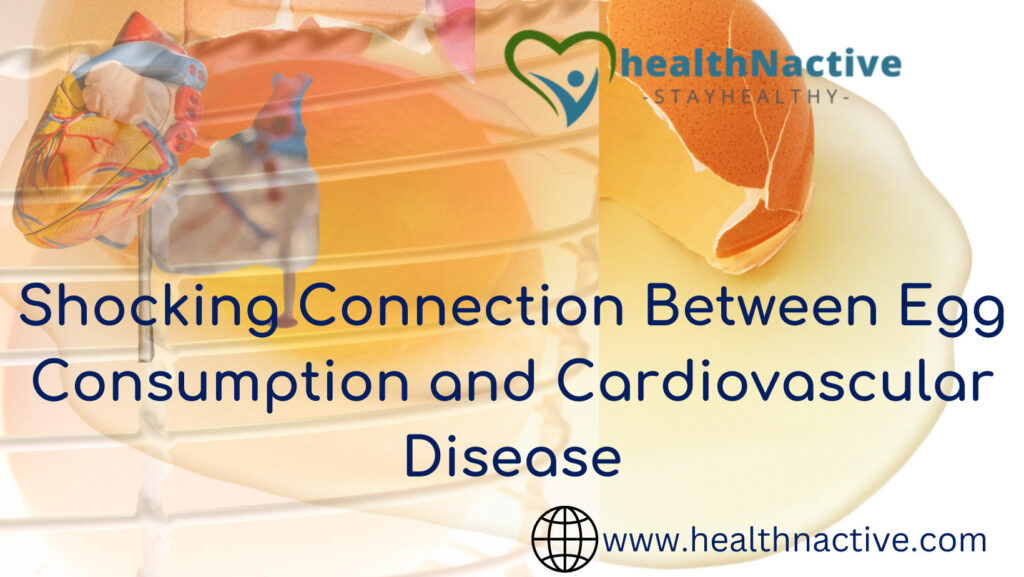The Shocking Connection Between Egg Consumption and Cardiovascular Disease
Cardiovascular disease is a leading cause of death worldwide and a major public health concern. With so much conflicting information out there, it can be difficult to know what to eat to maintain a healthy heart. One food that has been a topic of debate for decades is eggs. Some studies suggest that eggs are a cholesterol-rich food that can increase the risk of heart disease, while others indicate that eggs may actually be beneficial for heart health. In this blog, we will explore the relationship between egg consumption and cardiovascular health and separate fact from fiction.
The cholesterol in eggs has long been a source of concern for those looking to maintain a healthy heart. Eggs contain high levels of cholesterol, with an average of 186 mg per egg yolk. However, it’s important to note that dietary cholesterol is not the same as blood cholesterol. Blood cholesterol levels are influenced by many factors, including genetics, lifestyle, and the types and amounts of fat and carbohydrates in your diet. While dietary cholesterol can contribute to elevated blood cholesterol levels in some individuals, the effect is small compared to other factors.
Researches
Recent studies have found that moderate egg consumption (up to one egg per day) does not increase the risk of heart disease in healthy individuals. In fact, some studies suggest that eggs may even have a protective effect against heart disease. Eggs are a rich source of nutrients, including high-quality protein, healthy fats, vitamins, and minerals. One of the most important nutrients in eggs is choline, a nutrient that is important for heart health. Choline helps maintain healthy cell membranes, which are essential for healthy heart function.
Additionally, eggs are a good source of lutein and zeaxanthin, two important antioxidants that can help protect against heart disease by reducing oxidative stress and inflammation in the body. Eggs are also a good source of omega-3 fatty acids, which have been shown to reduce the risk of heart disease.
It’s important to keep in mind that while moderate egg consumption is unlikely to increase the risk of heart disease, it’s still possible for some individuals to be sensitive to dietary cholesterol. If you have high cholesterol or a family history of heart disease, it may be a good idea to speak to your healthcare provider about your egg consumption and any other dietary concerns you may have.
The Different Effects of Egg White and Yolk on Cardiovascular Health
Egg whites are the clear, protein-rich portion of the egg, while the yolk is the yellow, fatty portion. Egg whites are an excellent source of protein, but they lack the vitamins and minerals found in the yolk. Egg yolks, on the other hand, are a rich source of cholesterol, healthy fats, and other important nutrients.
While egg whites are a good source of protein, they lack the nutrients found in the yolk. Some people opt to eat just the egg whites in an attempt to reduce their cholesterol intake, but this may not be the best choice for heart health. The yolk contains important nutrients, such as choline, that are essential for heart health.
Nutritional value of eggs
Eggs are a nutritious food that provide a wide range of essential nutrients for the human body. One large egg contains about 6 g of protein, 5 g of healthy fat, and 1.6 g of saturated fat. Eggs are also a good source of vitamins and minerals, including:
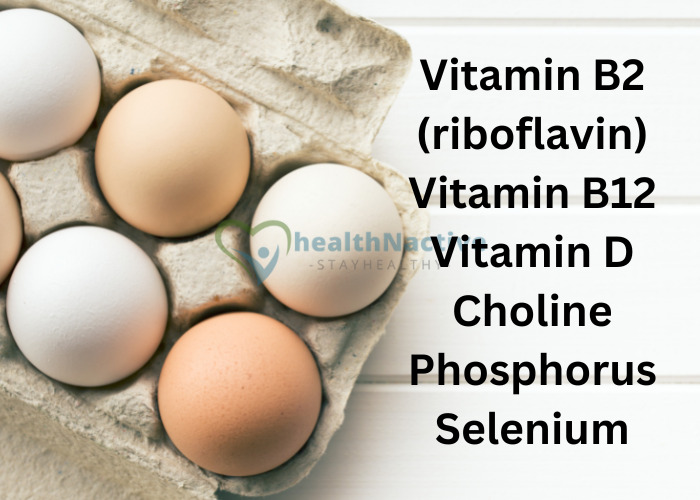
- Vitamin B2 (riboflavin): important for energy production and antioxidant function
- Vitamin B12: important for nerve function and red blood cell production.
- Vitamin D: important for bone health and immune function.
- Choline: important for brain health and liver function.
- Phosphorus: important for strong bones and teeth.
- Selenium: important for immune function and thyroid health.
Eggs are also a good source of antioxidants, such as lutein and zeaxanthin, which are important for eye health and reducing oxidative stress in the body. Additionally, egg yolks contain omega-3 fatty acids, which have been shown to have a protective effect against heart disease.
Antioxidants and heart health
Eggs contain a variety of antioxidants that have been shown to have a protective effect on heart health. One of the best-known antioxidants found in eggs is lutein, which is a carotenoid pigment found in the yolk. Lutein has been shown to have a protective effect against oxidative stress and inflammation, which are both risk factors for heart disease.
Another antioxidant found in eggs is zeaxanthin, which is also a carotenoid pigment found in the yolk. Zeaxanthin has been shown to protect against age-related macular degeneration, a leading cause of blindness, and may also have a protective effect against heart disease.
In addition to these antioxidants, eggs are also a good source of vitamin E, which is another important antioxidant for heart health. Vitamin E has been shown to reduce oxidative stress and improve heart health by reducing inflammation and improving endothelial function (the function of the cells that line the blood vessels).
While egg whites are a good source of protein, they do not contain the same level of antioxidants as the yolk. This highlights the importance of consuming the whole egg, rather than just the whites, in order to get the full range of nutrients and health benefits that eggs have to offer.
Potential drawbacks of eating only egg whites
While egg whites are a good source of protein and low in calories, eating only egg whites can lead to some potential drawbacks. Here are some of the most notable:
- Lack of nutrients: The yolk of the egg contains many important nutrients, including vitamins A, D, E, and K, as well as choline and antioxidants like lutein and zeaxanthin. By removing the yolk, you miss out on these important nutrients.
- Reduced satiety: The fat and protein content of the yolk make the whole egg more filling and satisfying. By only eating the whites, you may not feel as full and satisfied after eating, which could lead to overeating.
- Increased risk of nutrient deficiencies: without the yolk, you may miss out on important nutrients that are essential for optimal health. This could lead to deficiencies over time and increase the risk of certain health problems.
- Increased risk of cardiovascular disease: While the yolk does contain cholesterol, research has shown that moderate egg consumption does not increase the risk of heart disease in healthy individuals. In fact, the yolk contains important nutrients like choline and antioxidants that have a protective effect on heart health.
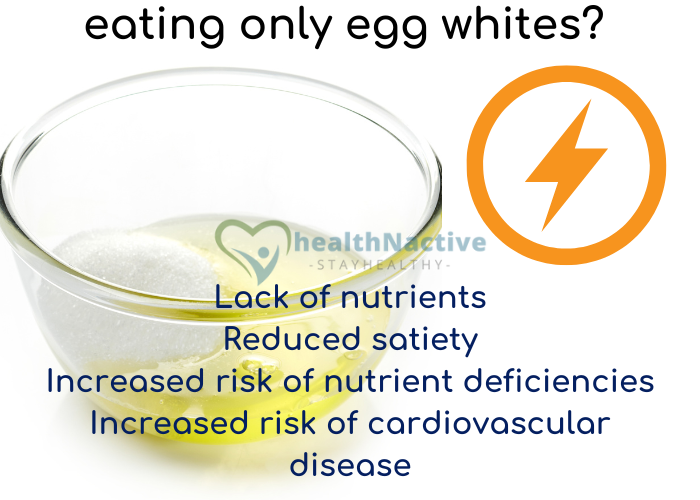
While egg whites are a good source of protein and low in calories, it’s important to consume the whole egg in order to get the full range of nutrients and health benefits. If you are concerned about cholesterol or calorie intake, it may be best to limit your overall egg consumption or choose egg substitutes that are lower in cholesterol and calories. However, it’s always best to speak with a healthcare provider before making any significant changes to your diet.
Who should limit egg consumption?
While moderate egg consumption is generally safe for most people, there are some groups who may need to limit their intake. These include:
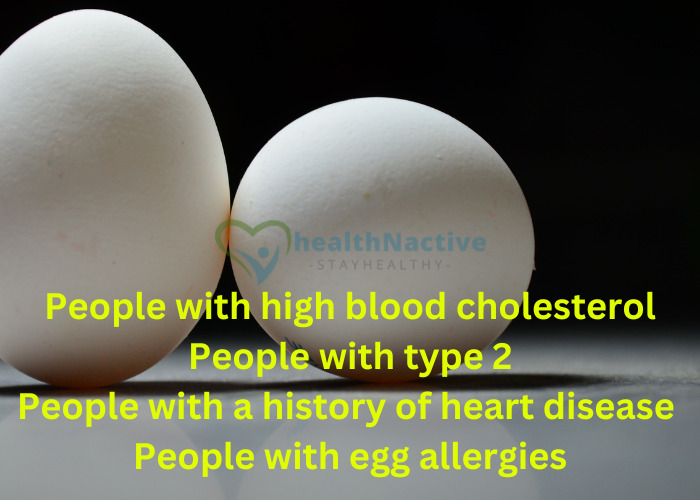
- People with high blood cholesterol: If you have high blood cholesterol levels, consuming a lot of eggs can contribute to this. It’s important to speak with a healthcare provider to determine the right amount of eggs for your individual needs.
- People with type 2 diabetes: Eggs can impact blood sugar levels and may not be suitable for everyone with type 2 diabetes. It’s important to work with a healthcare provider to determine the right amount of eggs for your individual needs and overall diabetes management plan.
- People with a history of heart disease: If you have a history of heart disease, it may be best to limit your egg consumption, especially if you have other risk factors like high blood pressure, high blood cholesterol levels, or a family history of heart disease.
- People with egg allergies: If you are allergic to eggs, it’s important to avoid them completely and look for egg-free substitutes in your diet.
It’s important to keep in mind that everyone’s nutritional needs are different, and what may be safe for one person may not be safe for another. It’s always best to speak with a healthcare provider before making any significant changes to your diet. They can help you determine the right amount of eggs for your individual needs and overall health status.
The Best Alternative to Eggs
If you need to limit or avoid eggs for dietary or health reasons, there are several alternatives available that can provide similar nutrients and health benefits. Some of the best alternatives to eggs include:
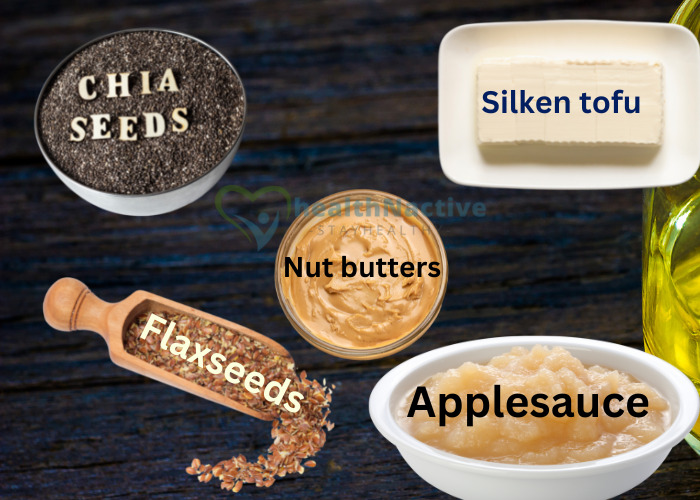
- Chia seeds: Chia seeds can be mixed with water to create a gel-like substance that can be used in place of eggs in recipes like baked goods or egg salad. They are high in fiber, protein, and omega-3 fatty acids.
- Silken tofu: Silken tofu can be blended and used as a substitute for eggs in recipes like scrambled eggs or quiches. It’s a good source of protein and contains a variety of vitamins and minerals.
- Flaxseeds: Flaxseeds can be mixed with water to create a gel-like substance that can be used in place of eggs in recipes like baked goods. They are high in fiber, omega-3 fatty acids, and contain some protein.
- Nut butters: Nut butters like almond or peanut butter can be used in place of eggs in recipes like brownies or cookies. They are high in healthy fats, fiber, and protein.
- Applesauce: Unsweetened applesauce can be used in place of eggs in recipes like muffins or cakes. It provides moisture and helps bind the ingredients together, while also adding some natural sweetness.
It’s important to keep in mind that egg substitutes may affect the texture and taste of recipes differently, so it may take some experimentation to find the right substitute for your needs. Additionally, it’s always best to speak with a healthcare provider before making any significant changes to your diet to ensure that you are getting all the nutrients you need to support your overall health.
Conclusion
The relationship between egg consumption and heart health is complex and has been a source of confusion and controversy for many years. However, the latest research suggests that moderate egg consumption is unlikely to increase the risk of heart disease and may even have a protective effect. If you have concerns about your heart health, speak to your healthcare provider about the best dietary choices for you.
Eggs are a nutritious and versatile food that can be a part of a healthy diet for most people. As with any food, moderation is key. To keep your heart healthy, aim for a balanced diet that includes a variety of fruits, vegetables, whole grains, lean protein, and healthy fats.

